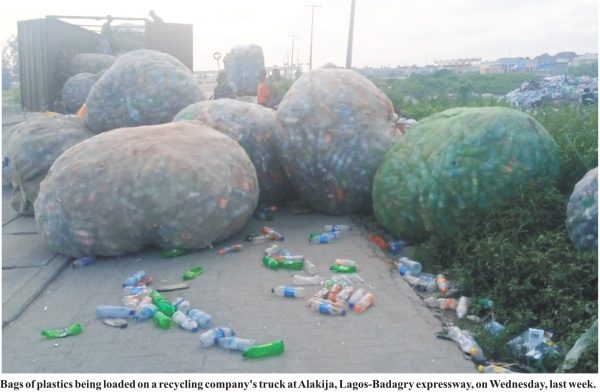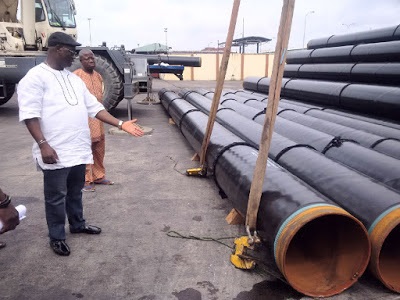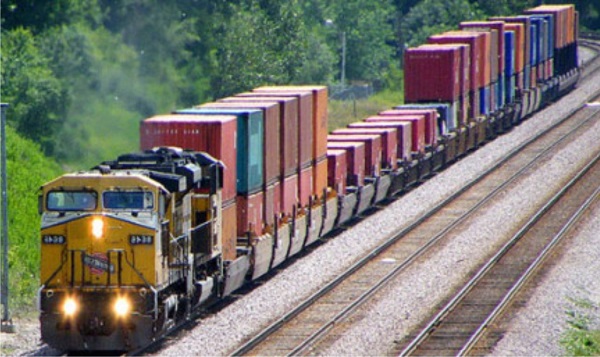Tackling The Menace Of Rickety Trucks
By Yusuf Odejobi
News of containers falling off trucks conveying them has become worrisome and there is a dire need to mitigate these accidents which have led to avoidable loss of several lives and valuable properties. While these increasing occurrences of accidents have caused permanent disability or death to Nigerians, leaving a trail of sorrow on the victims and their families, research shows that the majority of the mishaps were results of rickety vehicles.
Aside the road conditions, a number of container laden trucks plying Apapa-Oshodi Expressway can be seen with different deformity which often leads to these accidents such as broken headlamps replaced with torchlight, broken tail light, containers not properly latched or hooked, broken mirrors, non-functional brakes, over-aged trucks, damaged body parts, lack of proper maintenance among others.
Investigations further revealed that some truck drivers upon leaving the port tend to unlatch their containers. Reasons, they are concerned about the truck overturning with the container when it enters a pothole or trying to traverse a corner. Their belief is that when the container is latched onto the truck, it can overturn with their trucks, so they would rather allow the container to overturn itself.
Meanwhile, the lashing of containers is usually done in the port under the supervision of terminal operators and the Nigerian Port Authority (NPA), it is pertinent to ask what the government is doing to prevent this act?
Experts have categorized the causes of road accidents in Nigeria into human, mechanical, and environmental factors, disclosing that the human factor is responsible for about 90 percent of the accidents, with mechanical and environmental factors accounting for 10 percent.
The human factors include the use of cell phones while driving, driving under the influence of alcohol, drugs or a dangerous substance, disregard for road signage, dangerous driving/overtaking, overspending, overloading, fatigue on the part of truck drivers who are always on long journeys without stopping and resting.
Nigeria Bureau of Statistics (NBS) report on road transport data crashes in the third quarter of 2020 reflected 682 trucks and 210 container trailers respectively.
According to the World Health Organization (WHO), Nigeria recorded the highest in road traffic injury rate in Africa with road traffic injury and death rates at 4120 per 100000 population and 33.7 per 100000 population respectively.
In a bid to tackle the menace of unlatched containers and erring truck drivers tagged “Operation Scorpion”, the Federal Road Safety Corps (FRSC), in 2020 between August and September arrested and impounded 531 trucks for operating below Road Transport Safety Standards Scheme (RTSSS) which includes speed device, vehicle documents, standards tyres, locking of containers, driver licenses to mention a few. A number of them were arraigned in mobile court, some convicted and paid various fines.
The recent reported cases of a container falling on a vehicle happened in February and March this year fortunately with no death recorded. The February incident happened at Greensprings School Anthony Village, in Lagos, when a container laden truck fell on a private car while for the month of March happened at Barracks Bus Stop inward Trade Fair, Lagos, when a 40-foot container fell on three (3) vehicles and a tricycle.
Speaking with MMS Plus newspaper, the President, Association of Maritime Truck Owners (AMATO), Chief Remi Ogungbemi, argued that most containers that fall on the road are not deliberate ploys by truckers, but accidents.
He, however, listed other contributors to include the poor condition of the roads, negligence on the part of the operator or driver, defect or mechanical issue on the vehicles, containers not being properly fastened to the truck, among others.
According to him, accidents happen everywhere, “it’s not only on containerized trucks, even ships, aircrafts have accidents but when it happens investigations will show what led to the accidents. For truck accidents, there is little concern about carrying out an investigation to find out the causes. This is bad for the sector”
Meanwhile, he noted that it is improper for trucks to move with broken mirrors, damaged body parts or without any normal electrical fittings but also attributed such unprofessional practices to the volatile environment the truck drivers operate in.
“At times you see security operatives smashing the body of a truck, smashing the windscreen, smashing the headlamps, sometimes they even go to the extent of removing the plate number. If the security operatives can do this then what do you expect,” he queried.
Ogungbemi also posited that most Nigerian roads can no longer accommodate the volume of activities, especially port access roads which is why the accidents and collisions keep reoccurring.
“Most of the accidents that happen on Apapa-Oshodi Expressway is a result of the congestion on the port access road and sometimes in an effort for the driver not to hit a human crossing the expressway the truck can collide with another vehicle.”
“Roads that should not accommodate more than 30,000 trucks or vehicles, about 50,000 ply on it at the same time so collusion is bound to happen.” He stated.
In an effort to establish what constitutes a rickety truck, our correspondent contacted the Corps Public Education Officer, ACM. Bisi Kazeem, who told MMS Plus the Corps officials are aware of the regulations and what qualifies as a rickety truck.
FRSC may have to publish the fine details that make a truck roadworthy and otherwise, as this would ensure more compliance to operational standards of trucks.
Also speaking, a chieftain of the National Association of Road Transport Owners (NARTO), Alhaji Abdullahi Inuwa Mohammed, said the association is very much concerned about the situation and was in collaboration with FRSC and other security agents to curb the menace.
Inuwa, however, noted that it’s a case of the security agents not being conscious of the importance of the mirrors and other electrical parts of a truck when they damage it.
His words: “Most times in an attempt to stop a moving truck, they throw different objects at it, breaking the side mirrors, headlight, navigator light etc which is not supposed to be so.”
“As a result of this you see truck drivers hanging torch-lights on the roof of their trucks which even against the rule of FRSC.”
Explaining the importance of the side mirrors, he said “the side mirror is very important to a truck driver on a road to see which vehicle wants to overtake it, which vehicle is coming behind and also fit easy navigation.”
He added that the union is in collaboration with road safety and other security agents, adding that the union is letting them know the importance of the parts of the truck they damage in an act of provocation caused by a truck driver.
According to him, the trucks impounded by FRSC during the “Operation Scorpion” were fined and the owners were made to fix all damaged parts of the truck before leaving the detention camp of the agency.
With the increasing volume of activities at the nation’s port and a gross reliance on trucking for cargo evacuation, it is important that this menace of rickety trucks and falling containers is given urgent attention.









